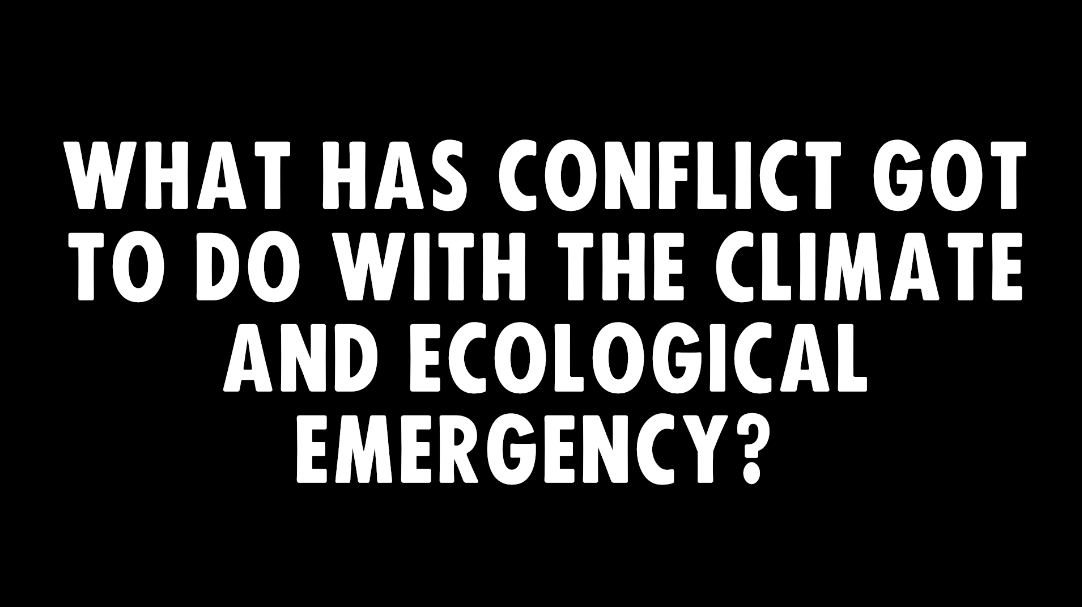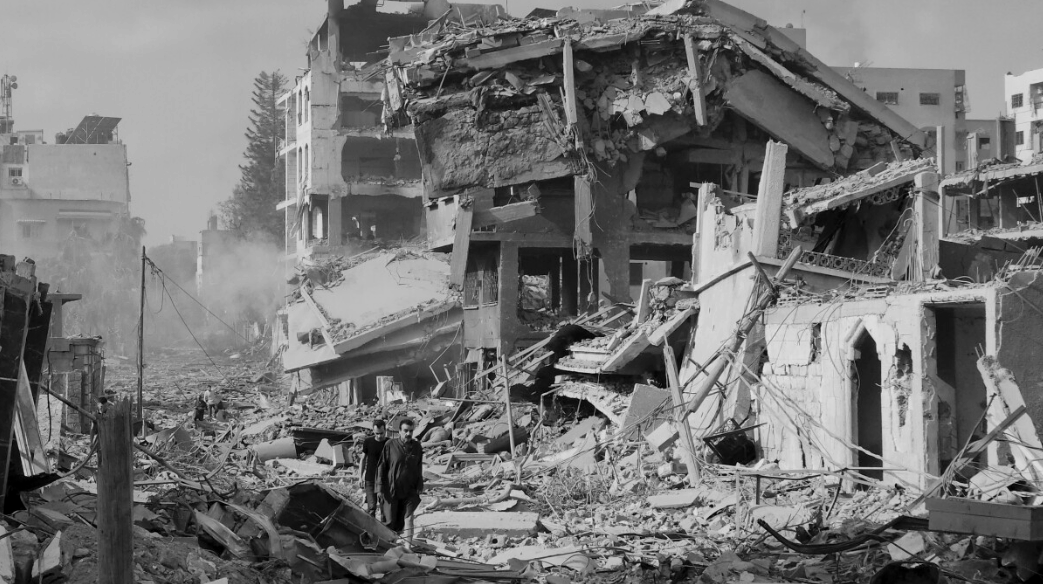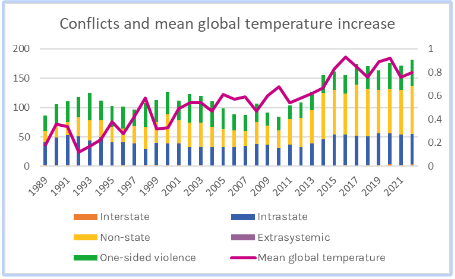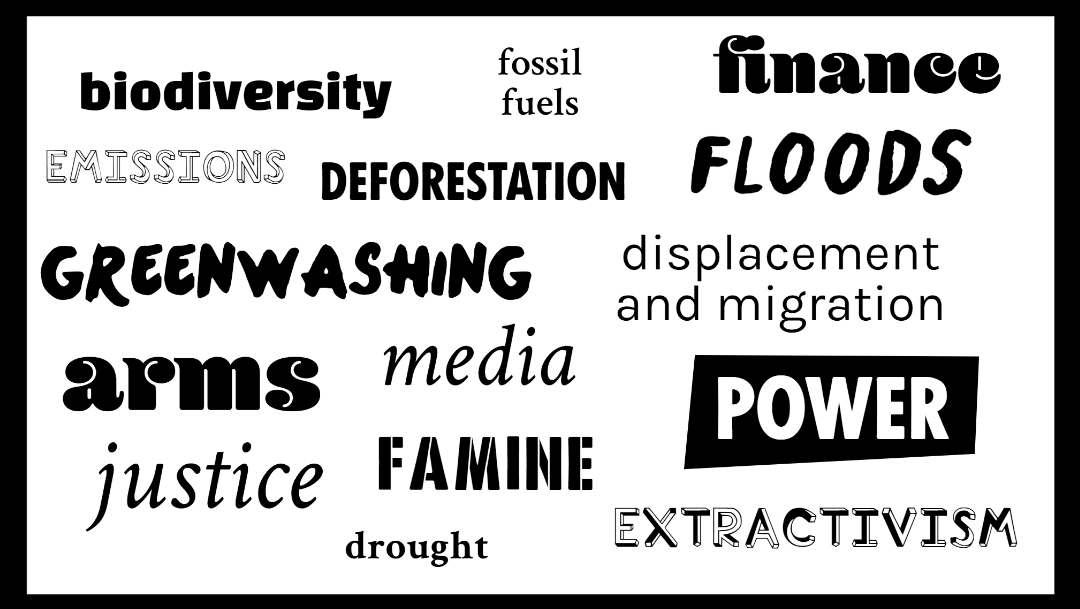War & Peace (messaging connecting conflict & climate)
See the Slideshow of this document to see the sources and references for the information on this page.
What are these messaging guidelines for?
There is a strong link between the climate and ecological emergency and conflict, but it is not a simple or linear one and so it is not one that people can always automatically connect to.
-
Of the 25 most climate-vulnerable nations, over half are already in conflict. A 2019 study from Stanford University found climate change contributed to between 3% to 20% of conflicts over the last century with the potential influence set to increase substantially due to warming global temperatures.
-
The Darfur conflict in Sudan is the first acknowledged "climate change conflict" triggered by ecological crises, drought, and rapid desertification, but almost certainly will not be the last.
-
War harms biodiversity in many ways, affecting land and natural resources, and contributing to the extinction and loss of species. Over 90% of the major armed conflicts between 1950 and 2000 occurred within countries containing biodiversity hotspots, and more than 80% took place directly within hotspot areas.
Just as the UK profits from the climate and ecological emergency, it profits from conflicts. Banks such as Barclays are investing in arms just as much as they are fossil fuel projects. The media creates a hierarchy of suffering, focusing time and attention on some conflicts and neglecting others – many of the conflicts happening in the world are rarely mentioned in the UK. A powerful thing rebels can do is redress this balance.
Peace and stability is essential for effective and timely climate action and adaptation by countries around the world. As Extincion Rebellion the most significant contribution we can make is to continue to apply pressure to the UK government to give power back to the people.
It is hoped these resources will empower you to speak with confidence about the connection between the climate and ecological emergency and conflict. If you need any additional support, please contact media@rebellion.earth
The climate and ecological emergency (CEE) is the ultimate expression of the crisis in our politics and our society. Both the CEE and conflict are rooted in oppression, both historic and current, and perpetuated by institutions and corporations entwined in a web of exploitation that profits from injustice. Unifying factors - such as exploitation, colonialism, racism and poverty bind these issues together, as those on the frontlines of the climate and ecological emergency are also likely to be suffering from violence and oppression.
It's all connected
There is already data that suggests that the number of conflicts is rising, along with the global temperature increase. This is a trend we are likely to see continue as the earth continues to heat, and the impacts of the climate emergency become more acute. Conflict over resources, destabilising of regimes and natural disasters will all exacerbate the situation.
“We are facing the highest number of violent conflicts since 1945. From Yemen to Syria, Myanmar and Sudan. From Haiti to the Sahel and on and on.” - Antonio Guterres, Secretary General of the UN.
- Interstate: A conflict between states- Intrastate: A conflict between a state and a non-state armed group inside the state’s territory
- Extrasystemic: A conflict between a state and a non-state armed group outside the state’s territory
- Non-state: A conflict between non-state armed groups, such as rebel groups, criminal organizations, or ethnic groups
- One sided violence: The use of armed force by a state or non-state armed group against civilians
Today's Armed Conflicts
Afghanistan, Azerbaijan, Burkina Faso, Cameroon, Central African Republic, Columbia, Cyprus, Democratic Republic of the Congo, Egypt, Ethiopia, Georgia, India, Iraq, Israel, Libya, Mali, Mexico, Moldova, Morocco, Mozambique, Myanmar, Nigeria, Pakistan, Palestine, the Philippines, Russia, Senegal, Somalia, South Sudan and Sudan, Syria, Turkey, Ukraine, Western Sahara, Yemen.
Source: Today’s Armed Conflicts - The Geneva Academy of International Humanitarian Law and Human Rights
Key Facts
- A 2019 study from Stanford University found climate change contributed to between 3% to 20% of conflicts over the last century with the potential influence set to increase substantially due to warming global temperatures.
- The World Food Program USA recognises that conflict and climate change are the two things driving most of the hunger in the world - but doesn’t talk about the overlap between the two.
- Each of the five major high street banks – Barclays, HSBC, Royal Bank of Scotland, Lloyds TSB and Halifax Bank of Scotland (now a subsidiary of Lloyds) – invests in, issues loans to and serves as principal banker for British and international arms companies.
- If the world's militaries were a single country, they would rank as the fourth or fifth largest emitter in the world, following China, the United States, India, and the European Union.
- Britain has sent £1.5bn worth of military equipment to 39 of the world’s 40 most climate-vulnerable countries since 2008, potentially inflaming both war and the global environmental crisis.
- Media research shows it is thought wars in Africa are of little interest to the West because they are happening to people too far away, who are too different, living in countries that are not ‘important’ enough.
- Yemen’s civil war has been declared the “world’s worst humanitarian crisis.”. Throughout the country, a catastrophic cholera crisis has developed, little in the country is functioning, millions of people do not have enough food, and more than 10,000 people have been killed in conflict. Drought has exacerbated the conflict by drying up water sources, putting more than half of the population at risk of extreme water shortages - estimated to be over 10m people.
- Armed and intercommunal conflict in the east of the DRC is a key driver of displacement, causing mass population movement and rendering local communities, refugees and internally displaced persons (IDPs) even more vulnerable to the impacts of climate change.
- The planet-warming emissions generated during the first two months of the war in Gaza were greater than the annual carbon footprint of more than 20 of the world’s most climate-vulnerable nations.
- The large-scale exploitation of oil by foreign companies operating in the theatre of war in southern Sudan is reported to have increased human rights abuses there and has exacerbated the long-running conflict, a conflict marked already by gross human rights abuses—two million dead, four million displaced since 1983—and recurring famine and epidemics.
- Landmines and other explosive remnants have directly killed many animals, including elephants in Sri Lanka, snow leopards in Afghanistan, tigers in Cambodia, gazelles in Libya, camels in China, and water buffalo in Vietnam.
- “In our rapidly changing world climate change – and its potential to trigger both violent conflict and mass migration – needs to be considered as an urgent priority for policymakers and business leaders alike.” Environmental Justice Foundation (EJF) director, Steve Trent 17
More facts can be found in the War and Peace doc and the spokesperson briefing. These will continue to be added to over time.
How are XRUK speaking about conflict?
Considerable thought from many teams has gone into this, and it is included here as a resource for the consideration of local groups.
- We forefront the climate and ecological emergency. We do not lose our identity as a climate movement - if we cannot speak from that lens, it is likely not the right topic for us. We do not have to speak about everything.
- We do not place one conflict above others This is a challenge, especially when we feel the moral imperative to speak about the horrors we currently see on the news. But actually this makes it all the more important to highlight the range of conflicts ignored by the media.
- We highlight the theme of unequal participation in power Speaking about conflict doesn’t absolve us of the need to always highlight our Third Demand in our messaging.
- We do not use the slogans of others. We use our own voice, explicitly making links to exacerbating climate impacts and consequential ecological disasters of conflict and do not reduce complexities of conflicts to taglines.
- We make space for the voices and experiences of those involved in conflicts. The diaspora community are a vital connection to this conversation, and a part of our strategy that has not yet achieved its potential.
- We do not become partisan or use messaging that picks sides We embrace a clear and unifying call for peace.
The events of October and 7th and beyond promoted a lot of conversation across the movement about how we could and should talk about this as XRUK.
There are so many people who are already doing work here, it is not for Extinction Rebellion to take that and make it our own. We should be supporting them, in a way that complements our aims as XR. .
One of our strengths as Extinction Rebellion is that we do not take a partisan stance, we do not pick sides. We are always guided by our three demands and principles and values. What we can bring of value to this conversation is to continue to unite people.
What does solidarity look like?
Solidarity takes many forms, and you should be sensitive to the feelings of the groups you are working with including rebels in your local group. You should seek to establish consent of your group, before embarking on potentially contentious actions or alliances. Many other groups may be happy for rebels to turn up at their events with flags and banners, or they may wish for you to not identify yourselves as XR. It is important to have conversations with your local group so you all know where the lines are for you, and others you are engaging with.
Some rebels will choose to take action with other groups, not as XR. The ecology of movements is a beautiful and varied thing, and there is a place for everything and everyone. We do not need to make everything about us.
The most important thing to remember as you nurture these relationships is that they are not ones that are for the duration of a topic being in the public consciousness - genuine and authentic solidarity carries on long after conflict has dropped out of the media cycle and stopped trending on social media.
It is important to remember that if we are identifying ourselves as Extinction Rebellion, we should be upholding our principles and values at all times. Not all groups we interact with hold our same commitment to nonviolence, in words or in deed. This may be in the form of chants or other behaviour we do not expect. Check out the de-escalation resources on the toolkit.
More Resources
- War and Peace full document- further reading
- War and Peace XR spokesperson briefing
- Source: Today’s Armed Conflicts - The Geneva Academy of International Humanitarian Law and Human Rights
- See the slideshow of this document to see the sources and references for the information on this page.
- Understanding Antisemitism and Islamophobia in the context of Israel and Palestine




